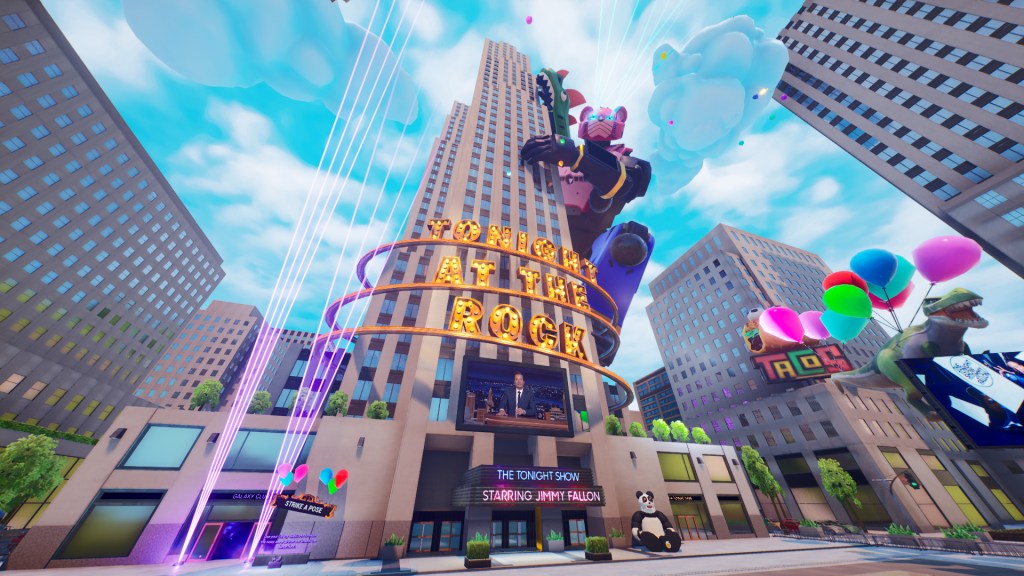Save 50% on a 3-month Digiday+ membership. Ends Dec 5.
Why companies like iHeartMedia, NBCU rely on homegrown IP to build metaverse engagements

To avoid potential blowback from a skeptical audience, retailers as well as media and entertainment companies are learning to invest in their homegrown intellectual properties while building virtual brand activations inside Roblox or Fortnite.
Take, for instance, when they get it wrong.
Earlier this week, Walmart launched its own Roblox world — called Walmart Land — and was roundly mocked for it across social media given the announcement’s disjointed brand message and apparent lack of life. In one viral tweet, a Twitter user described a clip of Walmart CMO William White introducing the Roblox space as “one of the saddest videos ever created.”
To some extent, this sort of criticism is to be expected during the early days of the metaverse.
“Walmart is an iconic brand; when you see them coming into a platform like Roblox, people are going to be 10 times more critical of what is being launched,” said Yonatan Raz-Fridman, CEO of the Roblox developer studio Supersocial.
But Walmart’s size is not its only disadvantage as it dips its toes into Roblox. Although Walmart has a widely recognizable brand, it owns few intellectual properties that users are actually interested in experiencing virtually — a shortcoming reflected by the somewhat cavernous emptiness of Roblox’s Walmart Land.
Ad position: web_incontent_pos1

The success of other recent brand activations is evidence that media and entertainment brands are better equipped to build metaverse spaces that can dodge online skepticism, thanks to their wealth of owned IP.
“They are having to reinvent themselves, to a certain degree, but that is in their DNA,” said Jesse Streb, global svp of technology and engineering at the agency DEPT. “So they have a unique advantage over, say, some kludgy company that sells lumber, or a construction company.”
For example, iHeartMedia’s Roblox and Fortnite spaces were inspired by the mass media corporation’s wealth of popular real-life events, such as the Jingle Ball Tour and iHeartRadio Music Festival, with virtual versions of musicians like Charlie Puth performing pre-recorded concerts that allow real-time audience interaction.
“There’s a strong brand association with the IP, down to a station level — you’re in the New York area, you probably know Z100,” said iHeartMedia evp of business development and partnerships Jess Jerrick. “The same is true for the event IP, or the IP that we now have in the podcasting space, and of course our radio broadcast talent. So there’s no shortage of really strong IP we can bring into these spaces.”
Ad position: web_incontent_pos2
Translating real-life properties into the metaverse is also an enticing prospect for brands that view metaverse platforms as an experimental marketing channel, allowing them to bring tried-and-true IP into their virtual activations instead of designing them from the ground level. This was part of the strategy behind the recent Tonight Show activation in Fortnite Creative, which was designed in collaboration between NBCUniversal and Samsung. “We’re looking at it holistically — how do we find fans in new ways, and use IP that fans love in new ways?” said NBCU president of advertising and client partnerships Mark Markshall.
Since opening on Sept. 14, iHeartLand has already enticed over 1.5 million Roblox users to visit. The company aims to retain that attention with a schedule of virtual programming featuring popular musicians and personalities.
“At our core, we are essentially an influencer network; our broadcast talent are some of the most connected, most engaging influencers at work in media today,” said Conal Byrne, CEO of iHeart Digital Audio Group. “That gives us this sort of superpower, to be able to go into new-ish platforms, like Roblox or Fortnite, because we talk to our listeners through those influencers.”
More in Marketing

Ulta, Best Buy and Adidas dominate AI holiday shopping mentions
The brands that are seeing the biggest boost from this shift in consumer behavior are some of the biggest retailers.

U.K. retailer Boots leads brand efforts to invest in ad creative’s data layer
For media dollars to make an impact, brands need ad creative that actually hits. More CMOs are investing in pre- and post-flight measurement.
Ad position: web_bfu



